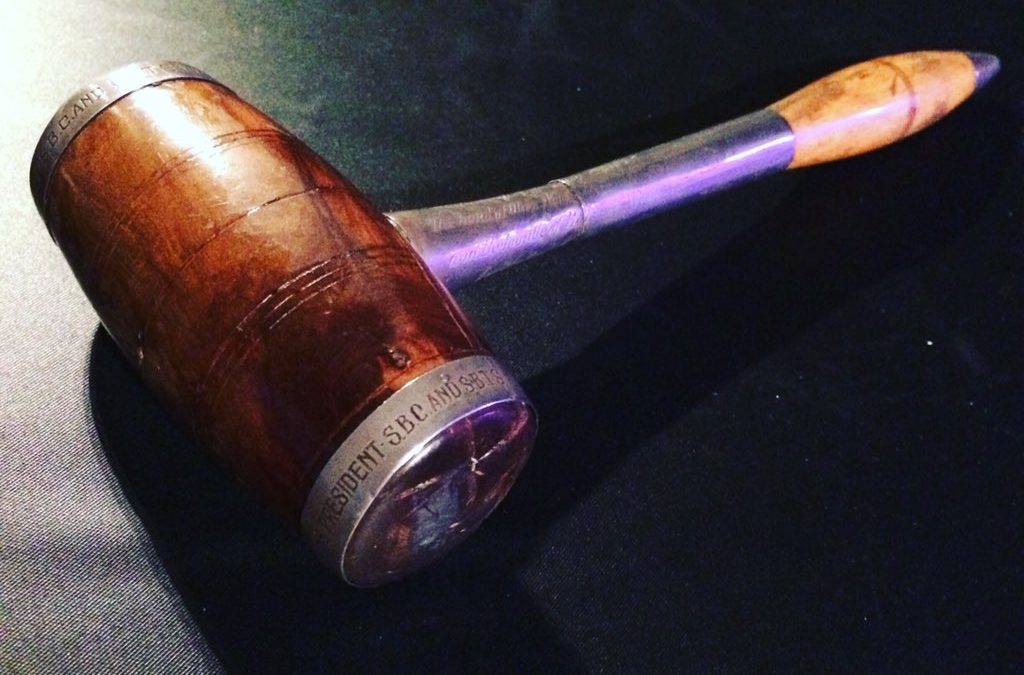By Will Hall, Baptist Message Executive Editor
ALEXANDRIA, La. (LBM) – The president of the Southern Baptist Convention has announced his plans to drop the use of a gavel with links to a racist seminary founder whose predeterministic beliefs, like those of many in the South, perpetuated his supportive views on slavery.
J.D. Greear, pastor of The Summit in Raleigh-Durham, North Carolina, announced just days prior to the end of his second term as SBC president, his intentions to “retire” the Broadus gavel, a little known artifact except to the few men who use it to bring to order or to end a session of the annual meeting of Southern Baptists.
Greear took the position because of the ties to slave owner John A. Broadus, one of four slave owners who founded the Southern Baptist Theological Seminary.
BACKGROUND
Broadus presented “a mallet for the use of the President” during the 17th annual meeting of the SBC, according to the 1872 SBC Annual which recorded the proceedings. It was something “which he had brought from Jerusalem for that purpose.”
The entry describes the gavel’s handle as being “made of the balsam tree which grows by the river Jordan forming a large part of that beautiful fringe of green trees which has always marked the banks of the sacred river, and beneath whose shade the multitudes looked on as the Saviour was baptized.” Likewise, the head is said to be made “of olive wood, reminding us of the Mount of Olives, from which He ascended to Heaven.” Finally, the record shows that the gavel was not intended to honor Broadus. Instead, its use was to remind Southern Baptists about “the beginning and the end of our Lord’s public work on earth.”
GREEAR’S REACTION
Greear said that receiving the item while about to call to order the messengers gathered in Birmingham, Alabama, last year, made him feel uncomfortable.
“Knowing that it was the Broadus gavel and knowing John A. Broadus’ [sic] views on race, I must admit that while we stood there, I felt a sense of unease,” he wrote in a FIRST PERSON published June 11 in Baptist Press.
“Here we were, a convention of nearly 48,000 independent autonomous churches, meeting in a city that has been filled with horrific history of civil rights abuses,” he explained. “While making historic moves in the areas of diversity, abuse, and mission, we were using a gavel named after a Southern Baptist who owned slaves and was deeply involved in our founding.”
BROADUS’S INFLUENCE THEN AND NOW
Broadus once served as Convention Preacher – in 1883, during the 28th annual meeting — but the denomination’s historical archives indicate he did not ever serve as an officer of the SBC.
Instead, his most notable tie to the SBC was his co-founding of SBTS in 1859 (14 years after the founding of the SBC) and later serving as that seminary’s second president (1889).
But, his support of slavery and the Confederacy is undeniable.
According to a self-generated study about the seminary’s ties to slavery, SBTS reported in 2018 that, during the Civil War, Broadus “drafted and presented resolutions pledging Southern Baptist support for the Confederacy.” After the emancipation of slaves, Broadus advocated for the relocation of SBTS to a more desirable location than Greenville, South Carolina (its original site), which one of his co-founders described as an “incubus and plague” simply because of the mere presence of freed slaves. Broadus was agreeable, saying he preferred to reestablish the seminary “in a white man’s country.”
Moreover, his opinion of slaves included the belief that “many of them are greatly superior to others in character, but the great mass of them belong to a very low grade of humanity,” as documented in a sermon he contributed to the Courier-Journal in 1893.
The SBTS report found that he and many others in the administration and on the faculty believed God predestined Africans to captivity and thus it would be going against God’s will, His providence, to oppose slavery — despite God’s condemnation of slave traders in 1 Timothy 1:10.
His name continues to grace the Broadus Chapel at SBTS.
SYMBOLIC MESSAGE
Meanwhile, Greear is set to take a stand on the little-known Holy Land gavel because of its ties to Broadus, and, he is making his case to remove it from service (impacting future SBC presidents to the extent that they will have to use one of several other historic gavels available to them).
“As we continue coming together for the sake of missions and church planting, keeping the Gospel above all our secondary and tertiary issues and uniting in the Baptist Faith and Message 2000,” Greear argued in concluding his FIRST PERSON, “retiring the Broadus gavel sends a symbolic yet tangible message that we are a convention of all people, made in the image of God, and who matter deeply to God.”




